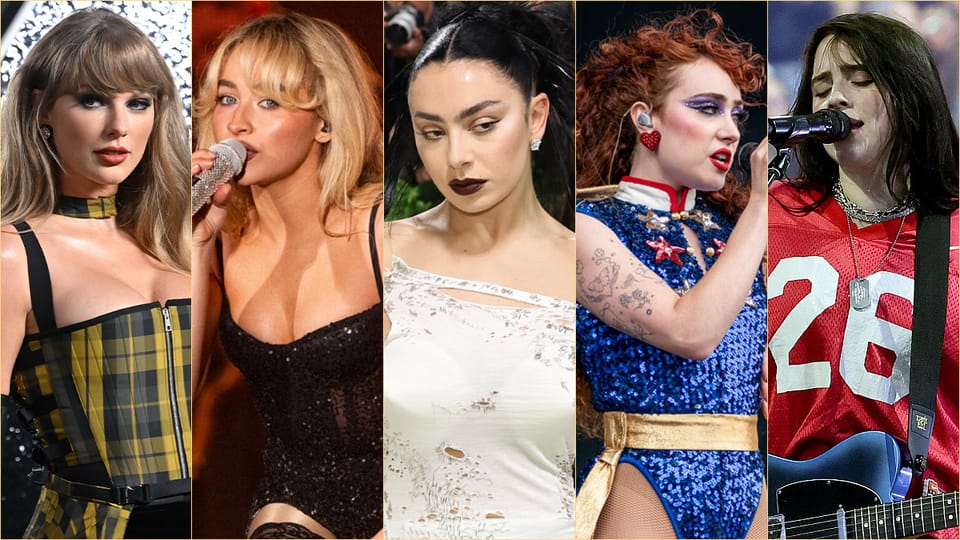Are We Selling Pop Girlies Short?

The big Swiftie news this week was the sweetest kismet (for my newsletter and my spotify) as I had already planned on bringing up a topic heavily influenced by my interest in Swift's music. It could be construed as a Hot Take, my deepest nemesis, but I think it mostly hinges around how you interpret and define "pop." Namely, is our current pop girlie moment truly that? Pop, I mean.

I would have preferred to link to the actual photos/post. Taylor let me in!!!!
Pop can mean a lot of things, and if you're looking at this purely through the concept of popularity, then certainly Swift, Beyonce, Olivia Rodrigo, Chappell Roan, Charlie XCX, Billie Eilish and Sabrina Carpenter certainly fit the bill. And the genre of pop is broad and malleable enough that it often crosses over with everything else. Indie pop, pop country, pop rock, pop punk - if pop is just a polished song that runs for less than 3 minutes on the radio, almost every successful musician and band have been pop artists but they don't get boxed in to that genre. I wonder if calling Rodrigo pop is perhaps dismissing her punk rock influences, or cutting off Taylor from so many of her eras - country, indie, synth. Is Chappell Roan actually cabaret? Is Charlie XCX a rave queen? What about Beyonce and R&B?
Is it just that we see a female artist with an eye for fashion and call her pop because pop is 'simpler' and 'dumber' and for the masses?
Pop can be complex and should be taken seriously as a musical genre, but in modern discourses it often isn't and that's because it's very female-forward and female-backed. Male pop artists usually reach that position because of the hordes of women they attract. To legitimize The Beatles in the 60s, they shifted from being referred to as a pop band with mainly young female fans to a rock band that was appealing to all college kids and young adults.
Pop can also be a signal of celebrity stardom. Taylor is an object of pop - since she is the sole front figure. Her worldwide status signals her popularity, therefore pop. But by calling her a pop artist, it's easier to dismiss her musicianship and the musicianship of the band she's been touring with for 15 years. Olivia Rodrigo and Roan both have bands they've been playing with for years. You know, like Bruce Springsteen. Or Tom Petty.
I want to be overly clear that I love all these artists and to this point I've been happily enjoying my bratty hot girl pop renaissance because at my heart I will always be an 8 year old dancing to Britney Spears - but wasn't one of the criticisms lobbed at that era that they didn't write their own songs? I don't think a singer has to write their own music to be a musician (ask me about my the American songbook), but this wave of female singer-songwriters is more reminiscent of the upsurge of the female folk pop creators of the 60s and 70s - Joan Baez, Stevie Nicks, Joni Mitchell, Carly Simon. But we don't call them pop. (Okay, maybe Carly.)
There are compelling arguments that complicate the idea. Bowie alternately released pop and rock albums, and creatively used his celebrity status to challenge notions of gender, music, and society. Michael Jackson was the king and purely anecdotally I've heard very little about his fangirls. (Please correct me if I'm wrong! I'd love to learn about vintage fandom.) If we look at pop in terms of the impact that a celebrity has culturally it would be hard to disregard any of these women. For those who enjoy pop, there's nothing lesser than about being a pop artist, and there's no reason to get nitpicky about the specific genre of a song you enjoy. However, it's worth examining what we're doing when we classify musically diverse artists as pop, and why we would do it.
So what do you think? Are we shortchanging female artists by labeling their work pop or is pop truly the best label for their music? Let me know in the comments (for paid subscribers), or email replies, or around the internet! I'd love to have opinions on this.
Side Quest: Well, that Doctor Who finale sure did happen. Ah. Hm. Welp. I've been self-soothing by doubling down into the Starsky & Hutch tag. Just passed my 3 year anniversary, baby!

The Fanthropologist is a weekly newsletter by Lena Barkin. Friday discussion posts are exclusive to paid subscribers. If you'd like to support the newsletter; tell your friends, consider leaving a tip, or sign up for a free subscription.

Member discussion